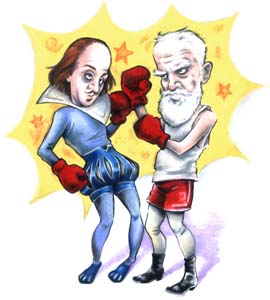![[MetroActive Stage]](/gifs/stage468.gif)
[ Stage Index | Santa Cruz | MetroActive Central | Archives ]
Shaw Shake Redemption
In a clash of titanic literary egos, George Bernard Shaw declared himself the winner in hindsight
By Richard von Busack
HOW GEORGE BERNARD Shaw would have seethed. This year's Shakespeare Santa Cruz alternates two plays by Shakespeare--Romeo and Juliet and The Two Gentlemen of Verona--with one, Arms and the Man, by George Bernard Shaw. "There is no eminent writer ... whom I can despise so entirely as I despise Shakespeare when I measure my mind against his," Shaw once wrote. "It would positively be a relief to me to dig him up and throw stones at him."
Shaw's loathing of Shakespeare is balanced by a different fury: deep green envy of the Bard, shared by anyone who has tried to make a living pushing words around. "I am convinced," Shaw wrote, "that ... had I been born in 1556 instead of 1856, I should have taken to blank verse and given Shakespeare a harder run for his money than all of the other Elizabethans put together." *
Shaw's envy was hardened by having suffered through enough bad productions during his tenure as a theater critic. And just as there's nothing better than Shakespeare well played, there's nothing more horrible than bad Shakespeare. Reviewing an Oxford production of Shakespeare, Shaw observed, "To play Shakespeare without considerable technical skill and vocal power is, frankly, to make an ass of oneself; and the contempt for the average undergraduate for such exhibitions is by no means mere Philistinism."
Compare and Contrast: Richard von Busack provides a handy summary of the differences between Shakespeare and Shaw.
Puns
Shakespeare is chock-full of them. Observe:
A triple pun in scene 1, The Two Gentlemen of Verona: the use of "boot" meaning "booty," in the old sense of the word ("treasure," not "ass"), "boot" meaning "usefulness" (opposite of "bootless," a very swank word for useless) and "boot" like the kind Tony Lama makes.
Shaw eschewed puns in preference to word play, as in his famous "Mr. Goldwyn [the film producer] and I could not come to an agreement, because he was only interested in money, and I was only interested in art." Shaw also liked the authority a writer can get from laying down crypto-scientific laws: "When a stupid man does something he's ashamed of, he always declares that it is his duty." "He who can, does. He who cannot, teaches." "The Golden Rule is that there are no golden rules."
Safe for Children?
The arch-humanist Shakespeare is a danger to all exposed to him. In his plays he punishes ambition, adultery and, worst of all crimes, being a foreigner. But he was possibly bisexual, unless the sonnets are only talking about palship.
Shakespeare's dangerous moral relativism is summed up in a moment from Othello: Desdemona's statement that "I would not betray my husband for the world" and her maid Amelia's rejoinder, "I would. Because once I owned the world, I could make its rules and do as I pleased."
Not to be outdone, Shaw wrote an essay titled "How to Beat Children."*** Plus he was concerned about the sexual reputation of Shakespeare in the loose 1890s. He once observed, "Shakespear [sic] was not the victim of that most cruel and pitiable of all freaks of nature; the freak that transposes the normal aim of the affections. Silence on this point means condemnation; and the condemnation has been general throughout the present generation. ... There is always some stock accusation brought against eminent persons. When I was a boy, every well-known man was accused of beating his wife."
Shaw is said to have had but one sexual encounter in a life that must have seemed even longer than its 94 years. His reputation is safe for posterity. No bachelor can stand accused of beating his wife.
*** Actually good advice. A child will forgive you if you smack him when you're angry. It's when you schedule a future time for punishment that he builds up a resentment that lasts for life. What former child could argue with this? Provided, of course, that you aren't the sort of parent who wallops his kid every time the 49ers lose.
[ Santa Cruz | MetroActive Central | Archives ]
Copyright © Metro Publishing Inc. Maintained by Boulevards New Media.
![]()

Terri Groat-Ellner
![[line]](/gifs/line.gif)
![[line]](/gifs/line.gif)
* From the Encyclopedia Spuriusiana, 1999: Sir George Bernard Shaw, Earl of Fabian (1556-88), author of notorious political blank verse plays The Tragedy of the Goodwife Warren, The Comedie of Pygmalione, Ye Man and Ye Supermanne and others. Executed for treasonous slander against the crown, 1588.
From the July 14-21, 1999 issue of Metro Santa Cruz.